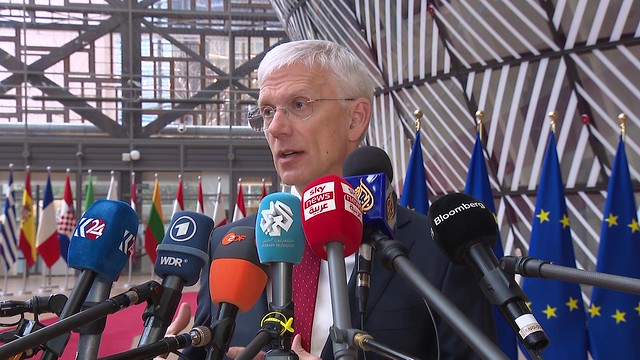On 18 March 2024, at the European Union (EU) Foreign Affairs Council meeting in Brussels, the Minister of Foreign Affairs, Krišjānis Kariņš, called for an increase in the sanctions pressure on Russia and for work to begin on the 14th round of sanctions against Russia in order to weaken its war machine through a ban on the import of the country’s agricultural products as well as expanding the export and transit ban on raw materials used in the Russian military industry to include the manganese ore and aluminium oxide.
At the Foreign Affairs Council, EU Foreign Ministers discussed Belarus, the Middle East, and support to Ukraine in its fight against Russia’s aggression.
In his comments on the results of the Russian President’s so-called “election”, Krišjānis Kariņš emphasized that it lacked any democratic legitimacy and “it was getting clear that nothing would change in the nearest coming years and Russia would remain on the warpath. We must work together to develop and strengthen the EU’s defence industry.” The Foreign Minister also called for implementing not only the individual Member States’ procurements but also joint EU procurements for deliveries of ammunition from third countries to Ukraine.
During the discussion on Belarus, Krišjānis Kariņš called for a plotting a course towards broader sanctions against the Lukashenko regime, while encouraging the EU to ensure visible support for the Belarusian democratic movement and civil society.
While addressing current developments in the Middle East, the Latvian Foreign Minister noted: “The EU must stand united to prevent a humanitarian disaster and move towards a two-state solution.” The Minister also highlighted the need to achieve the release of hostages taken by Hamas.
Latest developments in the Middle East was also one of the central matters in an informal exchange between the EU Foreign Affairs Ministers and the United States Secretary of State, Antony Blinken, who joined the Foreign Affairs Council via a video tele-conference.
During the Foreign Affairs Council, Foreign Minister Krišjānis Kariņš met with the German Federal Foreign Minister, Annalena Baerbock. The Ministers discussed how to rein in the Russian aggression and to support Ukraine. Krišjānis Kariņš and Annalena Baerbock agreed that further cooperation between the defence industries of Latvia and Germany would play an important role in a common solution for developing the military capabilities of Europe and Ukraine.





